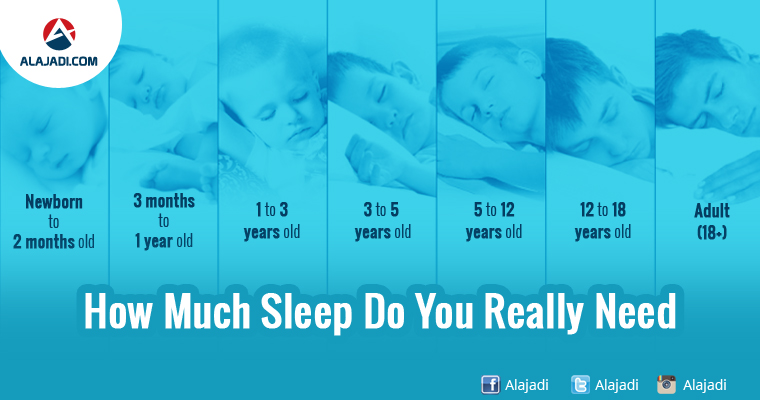How Much Sleep You Need According To Your Age !
Everyone knows that they need to take enough night’s sleep in order to maintain their mental and physical health. Everyone should also know that oversleeping is not good for their health, as it affects it in a negative way.
There is a plan for sleeping made by the National Sleep Foundation based on numerous studies in physiology, neurology, pediatrics, gerontology, and anatomy. This plan shows the number of hours everyone needs to spend sleeping according to their age.
- Newborns (0-2 months): Sleep range narrowed to 14-17 hours each day (previously it was 12-18)
- Infants (3-12 months): Sleep range widened two hours to 12-15 hours (previously it was 14-15)
- Toddlers (1-3 years): Sleep range widened by one hour to 11-14 hours (previously it was 12-14)
- Preschoolers (3-5): Sleep range widened by one hour to 10-13 hours (previously it was 11-13)
- School age children (5-12): Sleep range widened by one hour to 9-11 hours (previously it was 10-11)
- Teenagers (12-18): Sleep range widened by one hour to 8-10 hours (previously it was 8.5-9.5)
- Younger adults (18-25): Sleep range is 7-9 hours (new age category)
- Adults (26+): Sleep range did not change and remains 7-9 hours
We show you a list of 6 reasons why it is so important to be careful when it comes to your sleeping habits:
1. Back pain: Back pain can be caused by numerous factors, and sleeping a lot is one of them. The intensity and discomfort it brings is usually unbearable to live with, and lowers the quality of life in a person. If you tend to oversleep, your muscles weaken and, thus, the back suffers immensely. To repair this problem, cut down on the sleeping hours and try back exercises instead.
2. Obesity: When the body is rested but you force it to sleep longer, it can build up unnecessary energy inside. One study explains this process well.
3. Depression: Lethargy and depression can easily become the end result of both excessive sleeping and insomnia. The numbers show that 15% of people, who deal with depression, have unhealthy sleeping routine and this largely affects their emotional and mental health.
4. Headaches: Occasional but persistent headaches or even migraines may happen as result of irregular sleeping. If you sleep far too much, you run the risk of damaging neurotransmitters and cause terrible pain.
5. Diabetes: Insufficient sleep as well as excessive sleep can lead to diabetes. If you sleep too much or not enough, the body cannot produce glucose, so you are more exposed to suffering type 2 diabetes. Plus, you are at risk of dealing with insulin resistance. One study, involving 276 people for six years, discovered that their everyday habits those who slept less, showed more subjection to diabetes unlike those who had a regular sleeping regiment.
6. Heart disease: The heart’s work is closely related to the sleeping process. Incorporating healthy sleeping habits will guarantee you a healthy heart and vice versa- imbalanced sleep may lead to some heart conditions.




